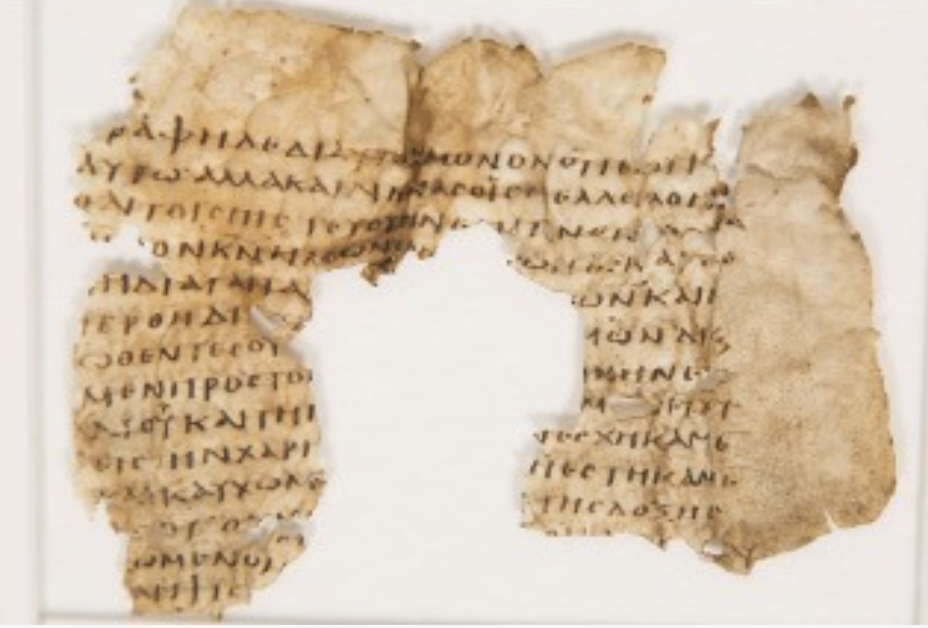Inspire 21-Day Devotional: Illuminating God's Wordਨਮੂਨਾ

WEEK 3, DAY 6: WHERE DID THE BIBLE COME FROM?
Greece
There had never been a conqueror quite like Alexander the Great. His subjugation of the Ancient Near East in the 4th century BC was much more than a military conquest; it was a comprehensive cultural conquest. In the scope of history, this would prove to be of greater impact: While Rome would take over the region less than two centuries later, Greek culture and language would persist throughout the duration of the Roman empire and beyond. In fact, the Romans were so influenced by Greek culture that, rather than resisting it, they adopted it as their own, adding only a thin Roman veneer.
At the heart of this Greek culture was a love for philosophy, an attempt to understand the world through reason and logic rather than relying on the religious myths of the day. All of life's big questions — Where did the world come from, and what was it made of? How should we live, and what was the basis for human morality and knowledge, anyway? — were fair game, and the best philosophers attracted the brightest students to their schools. Three philosophers stood head and shoulders above the rest: Socrates, Plato, and Aristotle. For Socrates, self-reflection and the art of asking critical questions—the Socratic method—led to true wisdom and a virtuous life. For Plato, wisdom came from a true understanding of the eternal and unchanging ideals beyond this material world. For Aristotle, it was not Plato’s Forms that led to knowledge, but an experiential, empirically based logic and study of the physical world.
While Socrates, Plato, and Aristotle differed in the fundamental tenets of their respective philosophies, all three had one thing in common: all lived and studied in Athens. For this reason, even long after their time, Athens remained the center of philosophy in the Greco-Roman world. Such was the case when Paul was invited to teach his new “philosophy” at the Areopagus (more literally translated as “Mars Hill”), a hallowed hill throughout Greece’s history reserved for serious council. And what was this new philosophy? That God sent his son to live, die, and rise from the dead. In Jesus Christ, what was unknown about God has been made known. Therefore believe, repent, and be saved!

Artifact: The Wyman Fragment
The Wyman Fragment is one of the oldest surviving manuscripts to preserve a portion of the book of Romans (4:23–5:3 and 5:8–13). The fragment dates to the late third or early fourth century and would have originally been part of a larger codex, or book. That this fragment and the New Testament were originally written in Greek shows the pervasive influence of the Greek language and culture throughout the Mediterranean world, even during Roman rule. While in Athens, the birthplace of Greek philosophy and culture, Paul presented a new philosophy to the people gathered at the Areopagus: In Jesus Christ, the way to reconciliation with the God of the universe had been revealed! Paul summarizes this gospel message in one of the most famous passages in Romans, a fragment of which is portrayed in the Wyman Fragment: “God demonstrates his love for us in this: While we were still sinners, Christ died for us” (Romans 5:8).
Q1. What are the main themes or ideas of the Scripture passage?
Q2. What does this devotional tell me about who God is?
Q3. How does this devotional challenge or encourage me?
Q4. What specific action can I take to live out this teaching?
Q5. Who should I share this with for encouragement or accountability?
ਪਵਿੱਤਰ ਸ਼ਾਸਤਰ
About this Plan

Welcome to this 21-day devotional journey designed to help you deepen your understanding of the Bible and grow in your faith. Over the next three weeks, we will explore the foundational questions that shape our approach to Scripture. By engaging with these questions, we hope you will not only gain a richer knowledge of the Bible but also develop a stronger sense of trust and connection to God’s Word. Each week, we will focus on one key question: What is the Bible? Can We Trust the Bible? Where Did the Bible Come From?
More
Related Plans

Everyone Should Know - Thanksgiving Special

When Heaven Touched Earth - a 7 Day Journey to Christmas

Lessons From Some Hidden Heroes in the Bible

The Mandate to Multiply.

Scriptures and Hymns to Grow Your Joy This Christmas

Hope in Creator’s Promises

OVERCOME Lust WITH TRUST

Your Prayer Has Been Heard: How God Meets Us in Seasons of Weariness and Waiting

Adversity
